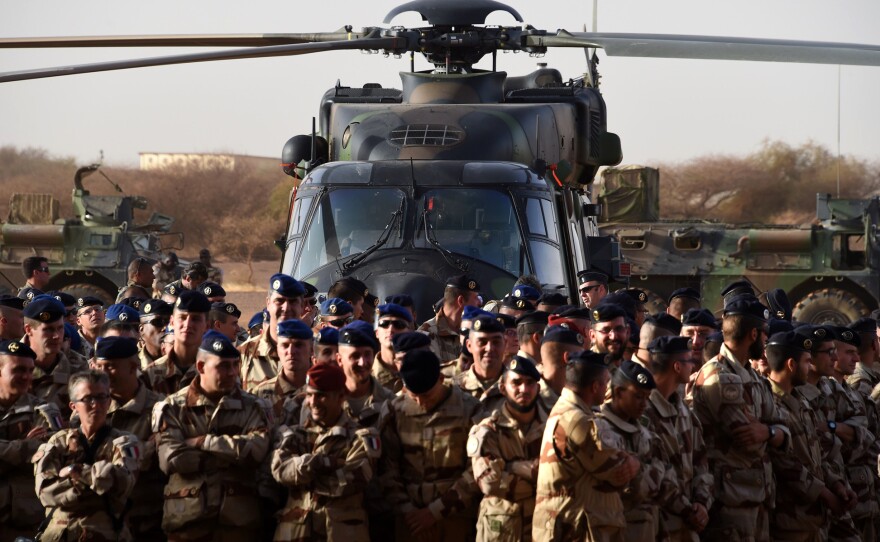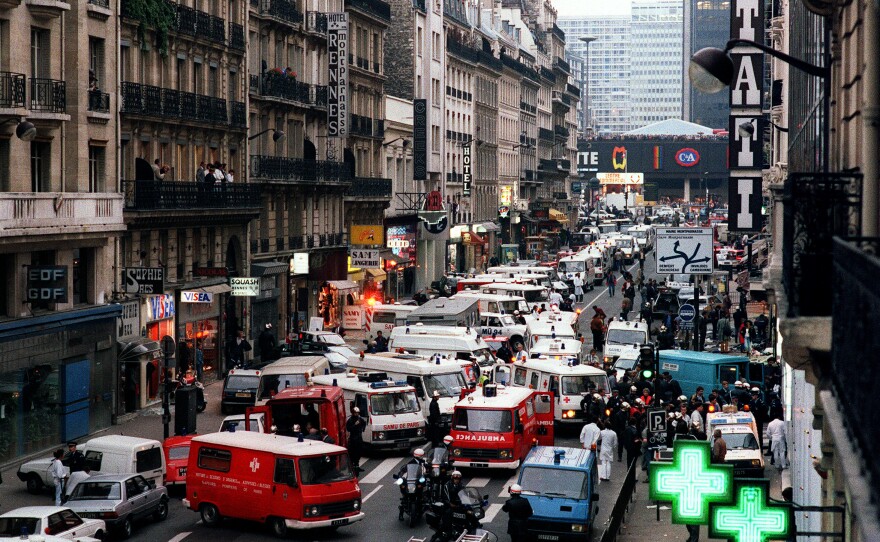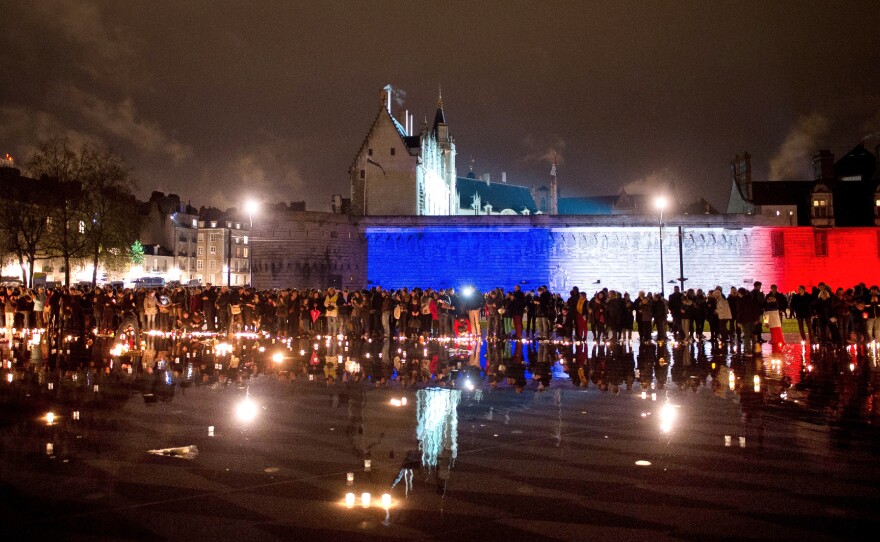

Many Americans have seen France as a country that wasn't supportive, bordering on antagonistic, as the U.S. waged wars against radical Islamists on several fronts following the 9/11 attacks.
Fair or not a decade ago, that image is outdated. Today, France is fully engaged in a battle against extremists. It's suffered two major attacks and several near misses this year and now appears more vulnerable to Muslim radicals than any other Western country.
"France has been under sustained assault from Islamist terrorists for the last 12 months," writes Robin Simcox in Foreign Affairs. "Although most of the attacks have been thwarted, their frequency — and the ways in which the French state has uncovered them — is alarming."
The Nov. 13 assault on Paris, with 129 killed, was the deadliest episode of terror in the West in more than a decade. The satirical magazine Charlie Hebdo was hit back in January.
Then there were several advanced plots or attempted attacks, like the one of the train that was broken up by three American men.
Friday's assault on the Radisson Blu hotel in Bamako, Mali, also bears mention. While the attackers and their motives remain murky, the hotel appears to have been targeted because it was a center for Westerners, and in Mali, that's a virtual synonym for France.
France was the former colonial ruler and some 7,000 French still live there. The French military intervened in 2013, sending in troops to push back Muslim extremists who seized the northern part of the country and claimed their own Islamic state. On Friday, French special forces troops took part in the rescue of the hotel guests and staff.
There's no one reason France is being hit more often than other Western states, but several factors that seem to be at play:
Turbulence In North Africa: France has had more extensive ties to Muslim regions in Africa than any other European country and remains deeply involved in a number of them until this day. The political, economic and personal connections that may be welcome during more normal times can have a major downside during a time of rising radicalism.
Muslim extremists in Africa harboring anti-Western views are more likely to have some sort of connection – and grievance — with France than any other Western country. In addition, France has at times backed authoritarian leaders facing Islamist insurgencies. France currently has several thousand soldiers assisting governments in five former colonies in Africa — Mali, Mauritania, Burkina Faso, Niger and Chad.
The simmering conflicts in this region often escape attention in the U.S., which has been more focused on wars further east in Syria, Iraq and Afghanistan.
Disaffected Muslims At Home: France's colonial history explains why it has the largest Muslim population in Europe, numbering an estimated 5 million, or about 8 percent of the population.
France has successfully absorbed immigrants from all corners of the globe, but North Africans have struggled more than most, and several recent attacks in France have been carried out by French citizens of North African descent.
"It hurts me to say it, but we know that these were French people who killed other French people," President Francois Hollande said following the Paris attacks.
The French experience is in contrast to the U.S., where Muslims have generally done well. Home-grown radicals in the U.S. do exist, but in lower numbers than in France and elsewhere in Europe.
"The slaughter in France depended on four things: easy access to Paris, European citizens happy to massacre their compatriots, a Euro-jihadist infrastructure to supply weapons and security agencies that lacked resources to monitor the individuals involved. These are problems the United States does not have — at least not nearly to the degree that Europe does," Steven Simon and Daniel Benjamin, former U.S. government officials now at Dartmouth College argue in The New York Times.
French Secularism: France keeps a strict separation of church and state under the principle of laïcité, or secularism. It's a principle that has broad support as a way for different faiths to co-exist.
As NPR's Paris correspondent Eleanor Beardsley has noted, "You would never hear the president say, 'God bless France.' You would never have a congressional prayer breakfast of lawmakers. People do not pray in public."
But this idea has also translated into laws that prohibit headscarves in public schools and government buildings and a nationwide ban on burkas.
All religions are covered by these policies, and no one draws a direct link between them and the violence in France. But they have been an ongoing source of friction in Muslim communities that feel displays of their faith are being restricted.
The Charlie Hebdo attacks in January exposed other fissures in French society. While the killings produced a strong sense of solidarity among the French, some Muslim students refused to participate in a moment of silence. In addition, some Muslims felt the magazine was deliberately antagonizing them with their unflattering depictions of the Prophet Muhammed.
"Every person who carries a French passport is to look and feel and act as if he or she is French in a very uniform kind of way," New York Times journalist Elaine Sciolino told NPR's Fresh Air. But "those with an Arab-sounding last name or a Muslim-sounding last name are stigmatized."
How Is France Responding? Radical Islam is not new to France. In 1985-6, the Lebanese group Hezbollah was blamed for seven separate bombings that killed more than a dozen people and wounded hundreds.
At the same time, French citizens were among those kidnapped with regularity in Lebanon's nasty civil war. So France has wrestled with counter-terrorism issues for decades.
While the U.S. has led the bombing campaign against ISIS in Syria and Iraq, France has carried out the second largest number of strikes. France is sending its lone aircraft carrier, the Charles de Gaulle, to the eastern Mediterranean to increase its capacity for bombing runs.
President Hollande, meanwhile, is looking for expanded powers that would include the ability to search homes more easily. The National Assembly on Thursday gave tentative approval to a plan to extending a state of emergency for three more months.
Greg Myre is the international editor of NPR. org. Follow him @gregmyre1.
Copyright 2015 NPR. To see more, visit http://www.npr.org/.






